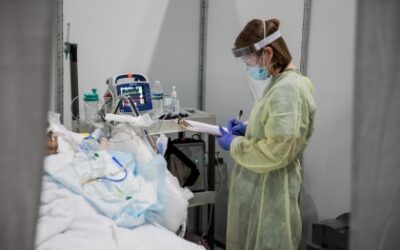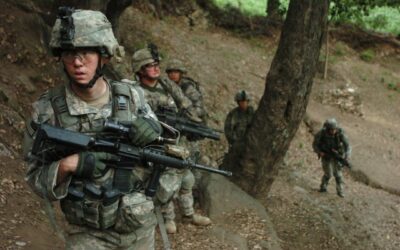Concerns raised by VA clinicians have played a central role in discussions of rebound cases of COVID-19 after treatment with the antiviral combination marketed as Paxlovid.
Ground-breaking Study in U.S. Military Finds Link Between MS, Epstein-Barr Virus
Researchers with the Uniformed Services University of Health Sciences (USUHS) and the Harvard T.H. Chan School of Public Health appear to have solved one of the most perplexing mysteries in medicine: What causes multiple sclerosis (MS)?
Multiple Myeloma Patients Usually Respond Well to COVID-19 Vaccines
While about one-fourth of blood cancer patients failed to produce detectable antibodies after COVID-19 vaccination, those with multiple myeloma fared better than most.
Genetic 17p Deletion Doesn’t Affect MM Survival by Race
African Americans have an increased incidence of multiple myeloma (MM) but do not appear to be at a disadvantage in terms of overall survival, however.
Hormones Affect Sexual Function After AHSCT
How do hormones affect sexual function recovery after autologous hematopoietic stem cell transplantation (AHSCT), which is the standard of care for younger patients with newly diagnosed multiple myeloma.
COVID-19 Pandemic Hits VHA’s MOVE! Weight-Loss Program Hard
The VHA acted quickly to convert its MOVE! Weight Management Program for Veterans to virtual care using telehealth when the COVID-19 pandemic hit in early 2020.
Drilling Down in Past Studies Can Help Individualize Type 2 Diabetes Treatment
One size doesn’t fit all, even when it comes to deciding which Type 2 diabetes patients would derive cardiovascular benefit from intensive glycemic control.
Million Veteran Program Helps Link Genes for Severe COVID-19, Other Diseases
From the earliest days of the pandemic, it was evident that people with certain medical conditions faced an increased risk of severe COVID-19.
Using Chemotherapy After Noninvasive Bladder Cancer
Using one dose of intravesical chemotherapy immediately following surgery for nonmuscle invasive bladder cancer is recommended in national and international guidelines.
Diagnosis of Bladder Cancer Has Dropped During COVID-19 Pandemic
In 2020, compared with baseline years 2018 through 2019, more than 2,000 fewer bladder cancers were diagnosed in the VA’s healthcare system.
Extracting VA Data on Invasive Bladder Cancer
Bladder cancer is the VA’s fourth-most-diagnosed cancer, and early diagnosis is important because, if the tumor spreads outside the bladder, the five-year survival rate is only about 38%.
Acute Stress Reactions Can Endanger Military Combat Teams, Others
A recent report from military researchers put the spotlight on combat-related acute stress reactions (ASRs) in servicemembers.
Speech Therapist Finds Way to Make Dining More Dignified at CLCs
For residents of VA’s Community Living Centers, dignity is a precious resource. Patients who are there for short rehab stays may be struggling with new, frustrating limitations.
Even With Equal Care, Advanced Prostate Cancer Rates Are Higher for Blacks
DURHAM, NC—Despite its status as the most common cancer in American men, prostate cancer remains significantly understudied in terms of its epidemiology. Previous research has shown a higher risk for prostate cancer overall among Black men, but whether that difference...
Could Adding a Checkpoint Inhibitor Improve Response to Belamaf in Multiple Myeloma?
INDIANAPOLIS—A number of drugs have recently been approved or are in clinical trials for treatment of relapsed/refractory multiple myeloma. Among them, belantamab mafodotin (Belamaf) has demonstrated the ability to eliminate myeloma cells both by direct cytotoxicity...
Quality Measures “Markedly Improve” NSCLC Surgery Outcomes for Veterans
LOUIS -- Surgery remains the first choice treatment for stage 1 non-small cell lung cancer (NSCLC) for patients who can withstand it. As a result, most patients with early stage disease and their physicians opt for surgery. A new study asks: Could establishment of a...
The Role of Social Determinants in Cancer in Young Women
Oncology research continues to better understand and quantify the role that social determinants play in the development of cancers to help find ways to reduce the burden of cancer on society and individuals.
Choosing the Appropriate Treatment for Fragile Patients with RCC
Targeted therapies have vastly improved survival in renal cell carcinoma (RCC), despite not offering a cure for many patients. More problematically, patients often develop resistance to the drugs.
Treatment Quandary Continues for Non-metastatic Castration-resistant PCa
While most men with non-metastatic prostate cancer respond to androgen-deprivation therapy initially, many later experience rising prostate-specific antigen levels that indicate they have developed castration resistance.
Women with Pathogenic Variants Excluded from Germline Testing after DCIS
Every year, 60,000 women in the United States receive a diagnosis of ductal carcinoma in situ (DCIS), a noninvasive form of breast cancer. Accounting for one in five breast cancer diagnoses, DCIS has increased with the adoption of routine mammography, but it is far more than just an artifact of imaging.
What Matters in Survival, Treatment of Lymphoid Cancers?
Oncologists balance the most effective treatment against the likelihood of adverse effects for every patient with cancer. Generally, the assumption is that older patients and those with more comorbidities and poorer performance status will experience more negative effects, including potentially fatal toxicity, from aggressive treatment. A study presented at the American Society of Clinical Oncology annual meeting in June calls into question this assumption for at least some patients and specific malignancies.
For Prostate Cancer, Liquid Biopsy Offers New Genomic Profiling Opportunities
Nearly a decade ago, the U.S. Food and Drug Administration approved the first liquid biopsy assay to monitor patients with prostate, breast, and colon cancer by measuring circulating tumor cells (CTC) in patients’ blood.
Choosing the Right Regimen for Elderly Patients with Advanced RCC
Most clinical trials provide limited guidance on the appropriate treatment of patients seen in clinical practice. Particularly in oncology, participants in trials tend to be significantly younger and in substantially better health than the average patient. Renal cell carcinoma (RCC) provides a clear example of the challenge.
nCRC, Sequencing Offers Better Guidance than Staining When Results Differ
Chemotherapy has long been a component in the first-line treatment for advanced or metastatic colorectal cancer (mCRC). A number of studies in recent years indicate that a subset of patients with specific genetic mutations do not respond well to the recommended 5-fluorouracil-based regimens, such as FOLFOX (5-FU, oxaliplatin, and leucovorin) or FOLFIRI (5-FU, irinotecan, and leucovorin) alone or in combination with other agents.
MHS Care Outshines Civilian Medicine in Multiple Myeloma
When a cure is not possible, longer life is the goal. For patients with multiple myeloma, extending survival is the best available option today, and one of the best ways to achieve that is to receive care through the U.S. Military Health System.
A Rare Cancer Prompts Sleuthing at the VA; New Options for MDS
VA researchers solved a mystery involving younger veterans who developed unusual and deadly cancers. They determined that patients currently using certain drugs, thiopurines, had triple the risk of myelodysplastic syndrome (MDS) and acute myeloid leukemia (AML) on an adjusted basis compared to those never exposed. The risks resolved with discontinuation.
Early Colonoscopy in Veterans With IBD Lowers Overall Mortality
Well-timed colonoscopy appears to improve overall survival in inflammatory bowel disease patients, but many VA patients aren’t getting screened regularly. A new study supported current VA practice guidelines that recommend colonoscopy intervals from one year to three years among patients with IBD who have extensive colitis or left-sided colitis.
Obstructive Sleep Apnea in Aging Women Tends to Differ From Men
Obstructive sleep apnea, a disorder associated with persistent collapse or narrowing of the upper airway during sleep, has been linked to several detrimental outcomes including excessive daytime sleepiness, high blood pressure, neurocognitive decline and metabolic disorders.
Smoking History Affects Overall Survival in Women With Breast Cancer
Largely because of its association with conditions such as lung cancer and cardiovascular/pulmonary diseases, cigarette smoking is the leading cause of preventable morbidity and mortality in the United States, with about 480,000 deaths each year attributable to the habit.
Costs of Severe Drug Reactions Resulting in Hospitalization at the VHA
Each year, approximately 2 million serious adverse drug reactions (ADRs) occur in the U.S. and are responsible for around 100,000 deaths, according to the Food and Drug Administration’s Center for Drug Evaluation and Research.



